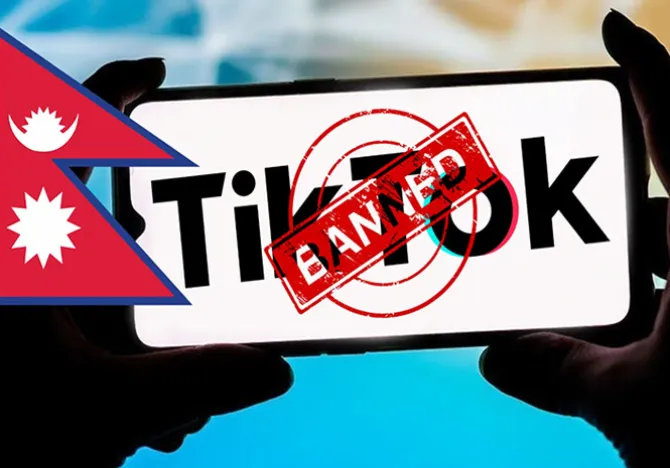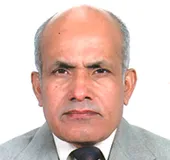
In its surprise move, the Government of Nepal announced a ban on the Chinese-owned app TikTok on 13 November on the grounds that its contents were detrimental to social harmony. Accordingly, the Nepal Telecommunications Authority (NTA) asked all the internet service providers in the country to block this app that was launched in the country in August 2018 by Beijing-based technology company ByteDance. It had emerged as the third most used platform in the country next only to YouTube and Facebook. By the time this app was banned, over 2.2 million out of the 30 million population in the country actively used it.
About the factor that forced the government to ban TikTok, Rekha Sharma, Minister for Communications and Information Technology said that it disrupted our “social harmony, family structure and family relations.” During the last four years, over 1,600 TikTok-related cyber crime cases have been registered with the government. Besides, TikTok was held responsible for promoting vulgarity on a large scale through short-form videos.
During the last four years, over 1,600 TikTok-related cyber crime cases have been registered with the government.
Being concerned with some of these negative impacts of TikTok, the Nepal government had repeatedly registered complaints with the TikTok company against its contents. It also wanted TikTok to appoint its representative in Nepal to address these issues. However, the TikTok office turned a deaf ear towards these concerns. This was one of the main factors that motivated the government to ban TikTok.
Following this development, the government asked all the media companies, including Facebook, X, and Instagram to open liaison offices and register with the Ministry of Information and Communication Technology in Nepal within three months. Failing to do so, they could have to face the same fate as TikTok.
Expressing its anguish over the TikTok ban, the TikTok office stated that such a move would not only affect its investment plans in Nepal but would severely affect the business activities in the country. Several small businesses in Nepal that used TikTok as an alternative means for marketing goods and services were heavily impacted by this decision as many were generating income through content creation.
Speaking almost in the same tone as the TikTok company, some of the rights groups, civil society representatives and cybersecurity experts in Nepal labelled this recent move of the government to ban TikTok as undemocratic, unconstitutional, and politically motivated. Nepali Congress leader Gagan Thapa said, “Regulation is necessary to discourage those who abuse social media, but shutting down social media in the name of regulation is completely wrong.”
Several small businesses in Nepal that used TikTok as an alternative means for marketing goods and services were heavily impacted by this decision as many were generating income through content creation.
Nearly 30 organisations in their joint statement criticised the government’s move to ban TikTok on the ground that it not only violated Article 17 (2 a) and Article 19 of the Nepalese Constitution guarantees freedom of expression, but it was also against the Universal Declaration of Human Rights and the International Covenant on Civil and Political Rights. As if this was not enough, 10 petitions were also filed in Nepal’s Supreme Court against the government’s decision to ban TikTok.
In South Asia, India was the first country to ban TikTok along with dozens of other apps by Chinese developers in June 2020 due to geopolitical reasons. Ever since October 2020, Pakistan intermittently banned the app four times. Unfortunately, TikTok has come under scrutiny as it is suspected to be a primary means to pass the data to the Chinese authorities. On this ground, the United States (US), the United Kingdom (UK), Canada, Indonesia, Australia, France, the European Union (EU) and hosts of other countries have partially or completely banned TikTok.
In Nepal, certain groups of people believe that TikTok was banned more due to factors rather than any other issues. Many of the youngsters aged between 16 and 24 years who are now involved in political movements for the restoration of Hindu state and monarchical institution mostly used TikTok to propagate their views. Such activities posed a certain threat to the existence of the present government in Nepal which is gradually becoming unpopular for its failure to check corruption, smuggling, and scandals one after the other. Over and above, it also challenged the secular, federal, and republican forms of the political system as the new force mostly supported the movement for the restoration of the Hindu state and monarchical institution that was abolished in 2008.
Many of the youngsters aged between 16 and 24 years who are now involved in political movements for the restoration of Hindu state and monarchical institution mostly used TikTok to propagate their views.
Over and above, the bilateral relations between Kathmandu and Beijing are not as warm as they used to be. Even during the recent visit of Nepalese Prime Minister Pushpa Kamal Dahal to China, no significant project could be signed between the two countries under China’s Belt and Road Initiative (BRI). On the contrary, Nepal allowed the anti-corruption agency in the country to conduct investigations into the case of a US$216 million international airport in Pokhara in Western Nepal that was financed and built by Chinese state companies. Even almost one year after its inauguration by Prime Minister Dahal, no international flight could operate at this Airport, although China treats it to be its flagship project. Amidst this distrust between the two countries, it gave an easy excuse to the government to ban TikTok at a time when it is believed to have disturbed social harmony in the country.
In fact, it would have been commendable if the government had adopted measures to penalise cyber-criminals instead of banning TikTok, but it cannot be ignored that it becomes too difficult to filter water if the floodgate is opened. TikTok for all practical purposes was not much different from opening the floodgate as it started brewing cybercrimes and creating hate among different sections of the society on a massive scale. Unscrupulous activities were flourishing so fast due to TikTok that it was not possible for the government to control them. So, Nepal chose to ban this app in the same way as it was banned by other countries of the world on security or other grounds. Since TikTok is now banned, it could be hoped that undesirable activities will be controlled and a positive environment will be created for establishing long-term peace and social harmony in the country.
Hari Bansh Jha is a Visiting Fellow at the Observer Research Foundation
The views expressed above belong to the author(s). ORF research and analyses now available on Telegram! Click here to access our curated content — blogs, longforms and interviews.




 PREV
PREV


